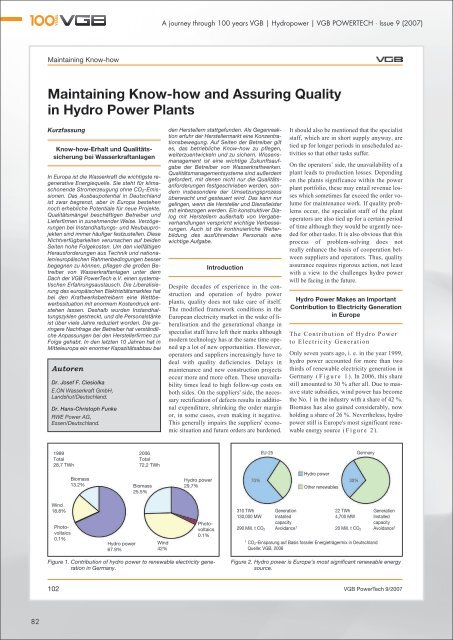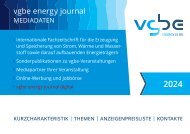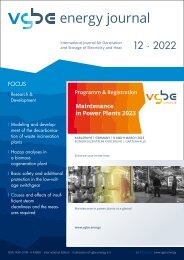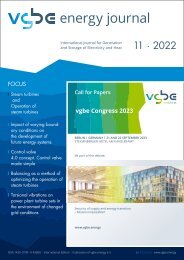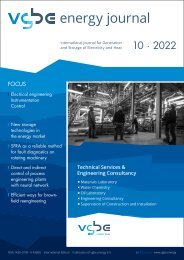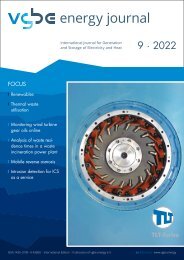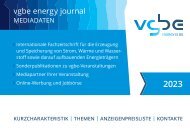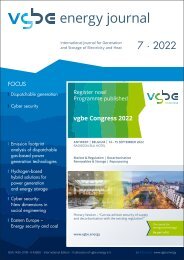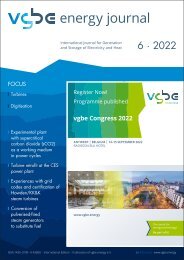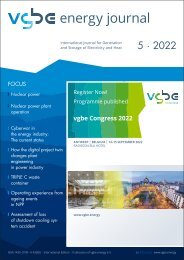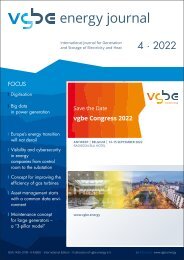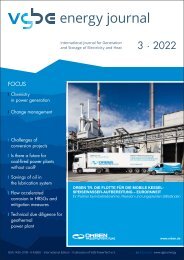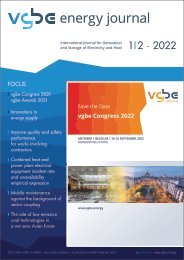VGB POWERTECH 7 (2020) - International Journal for Generation and Storage of Electricity and Heat
VGB PowerTech - International Journal for Generation and Storage of Electricity and Heat. Issue 7 (2020). Technical Journal of the VGB PowerTech Association. Energy is us! Maintenance. Thermal waste utilisation
VGB PowerTech - International Journal for Generation and Storage of Electricity and Heat. Issue 7 (2020).
Technical Journal of the VGB PowerTech Association. Energy is us!
Maintenance. Thermal waste utilisation
Create successful ePaper yourself
Turn your PDF publications into a flip-book with our unique Google optimized e-Paper software.
A journey through 100 years <strong>VGB</strong> | Hydropower | <strong>VGB</strong> <strong>POWERTECH</strong> · Issue 9 (2007)<br />
Maintaining Know-how<br />
Maintaining Know-how <strong>and</strong> Assuring Quality<br />
in Hydro Power Plants<br />
Kurzfassung<br />
Know-how-Erhalt und Qualitätssicherung<br />
bei Wasserkraftanlagen<br />
In Europa ist die Wasserkraft die wichtigste regenerative<br />
Energiequelle. Sie steht für klimaschonende<br />
Stromerzeugung ohne CO 2 -Emissionen.<br />
Das Ausbaupotential in Deutschl<strong>and</strong><br />
ist zwar begrenzt, aber in Europa bestehen<br />
noch erhebliche Potentiale für neue Projekte.<br />
Qualitätsmängel beschäftigen Betreiber und<br />
Lieferfirmen in zunehmender Weise. Verzögerungen<br />
bei Inst<strong>and</strong>haltungs- und Neubauprojekten<br />
sind immer häufiger festzustellen. Diese<br />
Nichtverfügbarkeiten verursachen auf beiden<br />
Seiten hohe Folgekosten. Um den vielfältigen<br />
Heraus<strong>for</strong>derungen aus Technik und nationalen/europäischen<br />
Rahmenbedingungen besser<br />
begegnen zu können, pflegen die großen Betreiber<br />
von Wasserkraftanlagen unter dem<br />
Dach der <strong>VGB</strong> PowerTech e.V. einen systematischen<br />
Erfahrungsaustausch. Die Liberalisierung<br />
des europäischen Elektrizitätsmarktes hat<br />
bei den Kraftwerksbetreibern eine Wettbewerbssituation<br />
mit enormem Kostendruck entstehen<br />
lassen. Deshalb wurden Inst<strong>and</strong>haltungszyklen<br />
gestreckt, und die Personalstärke<br />
ist über viele Jahre reduziert worden. Die geringere<br />
Nachfrage der Betreiber hat verständliche<br />
Anpassungen bei den Herstellerfirmen zur<br />
Folge gehabt. In den letzten 10 Jahren hat in<br />
Mitteleuropa ein enormer Kapazitätsabbau bei<br />
Autoren<br />
Dr. Josef F. Ciesiolka<br />
E.ON Wasserkraft GmbH,<br />
L<strong>and</strong>shut/Deutschl<strong>and</strong>.<br />
Dr. Hans-Christoph Funke<br />
RWE Power AG,<br />
Essen/Deutschl<strong>and</strong>.<br />
den Herstellern stattgefunden. Als Gegenreaktion<br />
erfuhr der Herstellermarkt eine Konzentrationsbewegung.<br />
Auf Seiten der Betreiber gilt<br />
es, das betriebliche Know-how zu pflegen,<br />
weiterzuentwickeln und zu sichern. Wissensmanagement<br />
ist eine wichtige Zukunftsaufgabe<br />
der Betreiber von Wasserkraftwerken.<br />
Qualitätsmanagementsysteme sind außerdem<br />
ge<strong>for</strong>dert, mit denen nicht nur die Qualitätsan<strong>for</strong>derungen<br />
festgeschrieben werden, sondern<br />
insbesondere der Umsetzungsprozess<br />
überwacht und gesteuert wird. Das kann nur<br />
gelingen, wenn die Hersteller und Dienstleister<br />
mit einbezogen werden. Ein konstruktiver Dialog<br />
mit Herstellern außerhalb von Vergabeverh<strong>and</strong>lungen<br />
verspricht wichtige Verbesserungen.<br />
Auch ist die kontinuierliche Weiterbildung<br />
des ausführenden Personals eine<br />
wichtige Aufgabe.<br />
Introduction<br />
Despite decades <strong>of</strong> experience in the construction<br />
<strong>and</strong> operation <strong>of</strong> hydro power<br />
plants, quality does not take care <strong>of</strong> itself.<br />
The modified framework conditions in the<br />
European electricity market in the wake <strong>of</strong> liberalisation<br />
<strong>and</strong> the generational change in<br />
specialist staff have left their marks although<br />
modern technology has at the same time opened<br />
up a lot <strong>of</strong> new opportunities. However,<br />
operators <strong>and</strong> suppliers increasingly have to<br />
deal with quality deficiencies. Delays in<br />
maintenance <strong>and</strong> new construction projects<br />
occur more <strong>and</strong> more <strong>of</strong>ten. These unavailability<br />
times lead to high follow-up costs on<br />
both sides. On the suppliers' side, the necessary<br />
rectification <strong>of</strong> defects results in additional<br />
expenditure, shrinking the order margin<br />
or, in some cases, even making it negative.<br />
This generally impairs the suppliers' economic<br />
situation <strong>and</strong> future orders are burdened.<br />
It should also be mentioned that the specialist<br />
staff, which are in short supply anyway, are<br />
tied up <strong>for</strong> longer periods in unscheduled activities<br />
so that other tasks suffer.<br />
On the operators’ side, the unavailability <strong>of</strong> a<br />
plant leads to production losses. Depending<br />
on the plants significance within the power<br />
plant portfolio, these may entail revenue losses<br />
which sometimes far exceed the order volume<br />
<strong>for</strong> maintenance work. If quality problems<br />
occur, the specialist staff <strong>of</strong> the plant<br />
operators are also tied up <strong>for</strong> a certain period<br />
<strong>of</strong> time although they would be urgently needed<br />
<strong>for</strong> other tasks. It is also obvious that this<br />
process <strong>of</strong> problem-solving does not<br />
really enhance the basis <strong>of</strong> cooperation between<br />
suppliers <strong>and</strong> operators. Thus, quality<br />
assurance requires rigorous action, not least<br />
with a view to the challenges hydro power<br />
will be facing in the future.<br />
Hydro Power Makes an Important<br />
Contribution to <strong>Electricity</strong> <strong>Generation</strong><br />
in Europe<br />
The Contribution <strong>of</strong> Hydro Power<br />
to <strong>Electricity</strong> <strong>Generation</strong><br />
Only seven years ago, i. e. in the year 1999,<br />
hydro power accounted <strong>for</strong> more than two<br />
thirds <strong>of</strong> renewable electricity generation in<br />
Germany (Figure 1). In 2006, this share<br />
still amounted to 30 % after all. Due to massive<br />
state subsidies, wind power has become<br />
the No. 1 in the industry with a share <strong>of</strong> 42 %.<br />
Biomass has also gained considerably, now<br />
holding a share <strong>of</strong> 26 %. Nevertheless, hydro<br />
power still is Europe's most significant renewable<br />
energy source (Figure 2).<br />
1999<br />
Total<br />
28,7 TWh<br />
2006<br />
Total<br />
72,2 TWh<br />
EU-25<br />
Germany<br />
Biomass<br />
13.2%<br />
Biomass<br />
25.5%<br />
Hydro power<br />
29.7%<br />
70%<br />
Hydro power<br />
Other renewables<br />
30%<br />
Wind<br />
18.8%<br />
Photovoltaics<br />
0.1%<br />
Hydro power<br />
67.9%<br />
Wind<br />
42%<br />
Photovoltaics<br />
0.1%<br />
310 TWh <strong>Generation</strong><br />
22 TWh <strong>Generation</strong><br />
290 Mill. t CO 2 Avoidance 1 20 Mill. t CO 2 Avoidance 1<br />
130,000 MW Installed<br />
capacity<br />
4,700 MW Installed<br />
capacity<br />
1 CO 2-Einsparung auf Basis fossiler Energieträgermix in Deutschl<strong>and</strong><br />
Quelle: <strong>VGB</strong>, 2006<br />
Figure 1. Contribution <strong>of</strong> hydro power to renewable electricity generation<br />
in Germany.<br />
Figure 2. Hydro power is Europe’s most significant renewable energy<br />
source.<br />
102 <strong>VGB</strong> PowerTech 9/2007<br />
82


